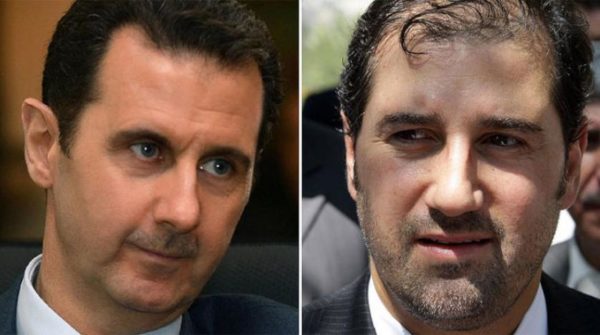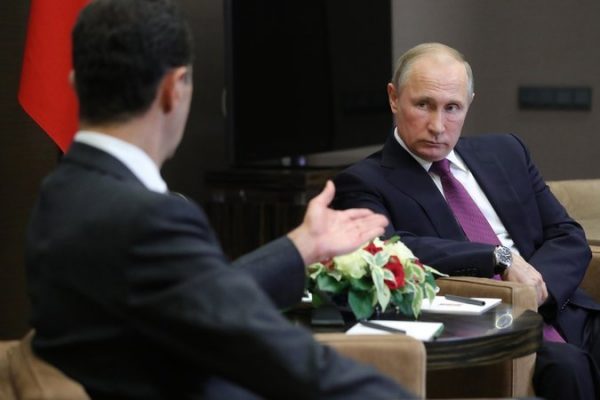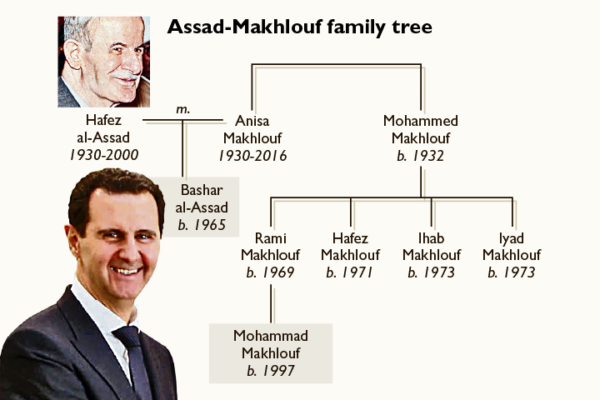 Reports have been circulating concerning the dismantling of Syrian tycoon Rami Makhlouf’s business empire at the direct orders of his cousin, Syrian President Bashar Assad.
Reports have been circulating concerning the dismantling of Syrian tycoon Rami Makhlouf’s business empire at the direct orders of his cousin, Syrian President Bashar Assad.
Syria watchers were unsure of what to make of the news, considering the lack of official reaction from Damascus. Pro-regime media outlets trumpeted the story but none published official confirmation.
Social media activists reported that Makhlouf, said to be the richest man in Syria, fell out with Assad after he was asked to provide $3 billion in cash to the Syrian Presidency. That money was urgently needed, he was told, to bankroll the military operation in Idlib.
Makhlouf reportedly said he didn’t have that amount of money at hand but Russian officials reportedly told Assad: “His money is in Russian banks. He can come up with that amount in two-three months.”

Authorities from the Syrian Ministry of Finance raided Makhlouf’s offices in Damascus, asking to see financial records. By early September, his shares in Syriatel, Syria’s first GSM operator, were seized by the Syrian government.
Duty-free shops he owns were grabbed by authorities at Damascus Airport and at Syria’s borders with Jordan and Lebanon. So was a charity organisation-turned militia called al-Bustan, which Makhlouf had bankrolled since 2011.
Al-Bustan ran a force of 10,000 militants, which government troops relied on for operations in Aleppo, Ghouta and Idlib. The militia has been disbanded.
Makhlouf neither resisted nor objected, putting himself fully at Assad’s disposal, realising he had made a mistake by lying to his boss and benefactor. Partial surrender of his immense wealth — estimated ten years ago at $6 billion — was certainly easier than a total collapse. His crime was multifaceted and big and he knew it.
In addition to lying, he had become too influential for the Assad family’s liking and started to exert incredible influence on the Syrian economy.
The news of his collapse led a dramatic hike in the exchange rate of the Syrian pound, which jumped from 600 pounds to the US dollar to unprecedented 700 pounds in ten days.
Sources in Damascus said stories about his house arrest were false, however, and so were rumours that his father and brothers had been confined to their homes.
 The Makhlouf family has exerted immense influence in Syria since the marriage of its daughter Anisa to air force pilot Hafez Assad, who became defence minister in 1966 and president of the country from 1971-2000.
The Makhlouf family has exerted immense influence in Syria since the marriage of its daughter Anisa to air force pilot Hafez Assad, who became defence minister in 1966 and president of the country from 1971-2000.
Makhlouf’s father, Mohammad, played an instrumental role in the smooth transfer of power to Hafez’s son, Bashar, in June 2000, serving as paternal uncle and “spiritual godfather” to the then-34-year-old president.
Bashar Assad heavily relied on Mohammad Makhlouf’s advice during his first years in power, especially during the 2003 US-led invasion of Iraq and after the 2005 assassination of Lebanese Prime Minister Rafik Hariri.
From 2000-10, Rami Makhlouf emerged as an influential figure through whom all international firms wanting to do business in Syria had to go, at fluctuating commission rates. An April 2011 report in the Financial Times claimed Makhlouf controlled 60% of the Syrian economy.
It was known in Syria that Makhlouf was on bad terms with Assad’s brother, Maher, an influential army officer, who may have advised Bashar Assad to turn against him, considering the 50-year-old businessman was becoming too strong and independent for his liking.
Had their mother Anisa Assad been alive, such a move would have been more difficult, given her known affection for the Makhlouf family. She died in early 2017, however, making it easier for her sons to turn against Rami Makhlouf.
Contrary to what many are saying, the Assads did not want to destroy Makhlouf but only to teach him a lesson. The men are lifelong friends and cousins, only four years apart in age.
The punishment ended there, however, since Makhlouf is expected to play a role in Syria’s future. Makhlouf’s private office was unscratched and so was his private residence. He was left in possession of Cham Holding, a mega-holding company, and Bena Properties, which is earmarked to play a role in real estate development and reconstruction when the war ends.
Al-Watan newspaper, which Makhlouf owns, remains in print. His shares were untouched at the International Islamic Bank, al-Baraka Bank, Cham Bank and Byblos Bank and so were the Choueifat School and the Syrian Private University, which are owned by Makhlouf.
Agencies

Leave a Reply
You must be logged in to post a comment.